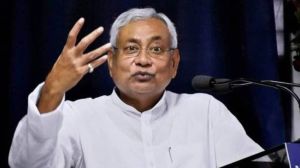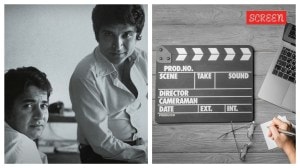Stay updated with the latest - Click here to follow us on Instagram
Pranab Mukherjee: ‘I have strong faith in the goodness of the masses…they will steer you to the destination’
Pranab Mukherjee spoke on the need for a strong Opposition, the role of people’s movements in a constitutional democracy and how India is in the safe hands of its people.
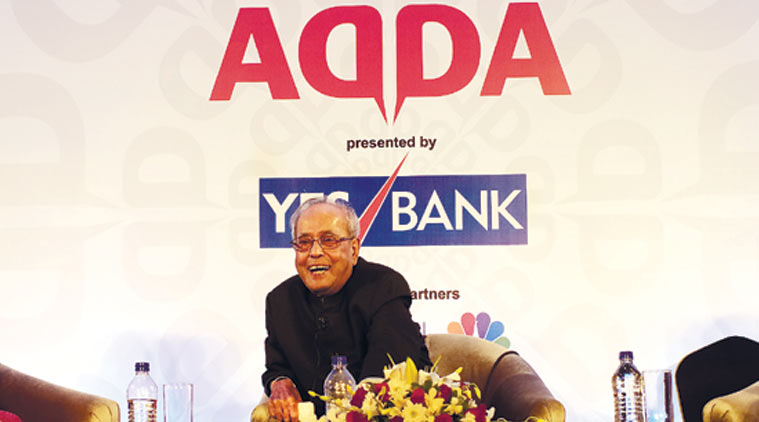 Former President Pranab Mukherjee at the Express Adda in Delhi.
Former President Pranab Mukherjee at the Express Adda in Delhi.
This edition of the Express Adda, held at The Claridges, New Delhi, hosted former President Pranab Mukherjee. In a discussion moderated by National Opinion Editor Vandita Mishra and Deputy Editor Seema Chishti, Mukherjee spoke on the need for a strong Opposition, the role of people’s movements in a constitutional democracy and how India is in the safe hands of its people.
On writing his memoirs
When I started writing my memoir, I decided it would not be on my personal life, it would be on my public life. That is why I started the first volume with my entry into Parliament in 1969. I completed the third volume when I left Parliament in 2012 after being elected President. The first volume, from 1969 to 1980, was subtitled The Indira Gandhi Years. The liberation of Bangladesh, the Emergency and its after effect are reflected in the chapters. The second book was titled, The Turbulent Years. It started with two assassinations — of Mrs Gandhi in 1984 and of Rajiv Gandhi in 1991. There were also turbulent activities in Punjab and other parts of the country.
There had also been frequent changes of government in this period but not as frequently, as it happened in the later years. There was a phrase used in the media — that the rule of a single party majority has come to an end and a coalition era has entered… Technically, you can say that the government now is also a coalition but, behind it, there is the presence of a very strong single party. Without the support of any coalition partners, the BJP alone can run the government on its own strength. I have tried to sum up all this.
On life after Rashtrapati Bhavan
As far as active politics is concerned, activism within the framework of a party, is not possible and is also not desirable. Frankly, I am a bit precedent-minded. You may call it a bureaucratic mindset. I do not find any precedent of any former President actively participated in politics with a party affiliation after his retirement. Somebody cited the example of C Rajagopalachari. He launched the Swatantra Party after he retired but always, in India’s parliamentary history, Rajagopalachari is an exception. He was the Governor General of India, after sometime he became the home minister of India, in the same government which was his government before 1952. After 1952, for sometime, he became the chief minister of Madras. It was undivided Madras Presidency. He was not the president, he was the Governor General.
 Constitutional jurist and senior advocate Fali Nariman, with wife Bapsi and Mark Tully (right), journalist and author.
Constitutional jurist and senior advocate Fali Nariman, with wife Bapsi and Mark Tully (right), journalist and author.
On the need for a strong Opposition
In a parliamentary democracy there should always be a strong Opposition. The presence of a strong Opposition is an essential ingredient of a successful parliamentary democracy. But unfortunately we didn’t have that. There was an Opposition party when the Indian electorate decided in 1977, when they gave Congress 153, and Janata Party more than 300 plus (seats). But that Opposition was also split into Congress (O) and Congress (I). That is a different story. Again, from 1980 to 1989, for almost 10 years, there was no Opposition party. During Rajiv’s tenure of five years there was no recognised Opposition party. After that, a recognised Opposition has come to exist.
On the role of the Congress in a post-Congress polity
What I understand is that a political party, which has a long history, will also have its ups and downs.
Could you imagine in 1984 that a political party which has only two seats in the Lok Sabha, will form the government in less than 20 years? So, for an electoral body to get less number of seats or to have a series of defeats in a small time frame of five years is no judgement on its future. If a political party, if it has its ideological moorings, participants may be very active, may not be active. But their support base remains. Sometimes hidden, sometimes inoperative, but it remains. And at the appropriate situation, it gets activated and the party redraws its strength. Also, it depends on the political situation. I have seen one of the most depressed phases of the Congress, with its first defeat in 1977, and also how it could be re-energised. Of course, there was the charismatic leadership of Indira Gandhi.
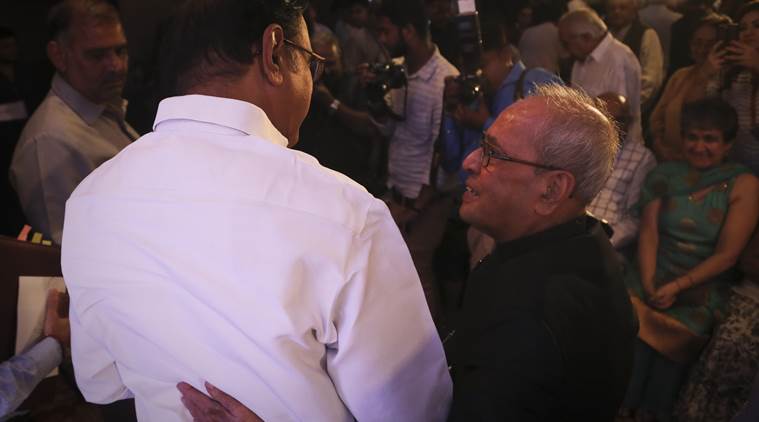 Former Presidend of India, Pranab Mukjherjee with P Chidambram at Express Adda, in Hotel Claridges, New Delhi, on Saturday, October 14, 2017. Express photo by Abhinav Saha.
Former Presidend of India, Pranab Mukjherjee with P Chidambram at Express Adda, in Hotel Claridges, New Delhi, on Saturday, October 14, 2017. Express photo by Abhinav Saha.
On memorable moments
There were moments when I felt excited, such as when I first presented the budget. I presented all three of my budgets before I completed 50 years of age. Then, when I was given the responsibility of the defence ministry. Immediately after my appointment as the defence minister, I had a meeting with senior officers. One day, at the end of a meeting, the then Admiral of the Naval Forces made a very witty comment and I burst into laughter. He had said, ‘Sir, I hope you are not carrying the baggage from the other side of the street’. The other side of the street means the finance ministry. He said, ‘Sir, I remember it was in 1982 and today is 2004, 22 years later. To give an additional Rs 25 crore to the Navy, you argued for more than 1.5 hours’. I said, ‘True, I did not have much appreciation of the requirement’.
On income inequality
No doubt, it is problem. But I feel with technological changes and the capacity of the Indian people to adapt themselves, they will find a way to solve this problem. Technology is always disruptive, and particularly with the speed with which it is changing, it is creating some sort of an uncertainty. And perhaps, it is one of the important lessons that public figures, administrators, legislators and policy makers should know about how quickly they can adjust with the disruptive technology. The faster they learn, the better will be the possibility to appropriate.

On diversity in India
I shut my eyes and ask, ‘What is India?’ There is a vast magnitude of masses, using more than 100 languages in their daily lives, practising several religions, and belonging to three major ethnic groups, living under one system, one constitution, one national identity. How is this possible? It is possible because of the inherent belief and confidence in accepting and celebrating the diversity. It is not merely because of any doctrine or any particular group, political party or a rule by the government or the Opposition. It is because diversity is inherent in every Indian. That is why I used to say as President that I agree that India is argumentative. India can always quarrel, but India can never be intolerant. Argumentative Indian is acceptable, intolerant Indian is unacceptable, not only to me but to the majority of Indians.
On the Emergency
I feel I should not comment on it. I decided I should not disclose these things, I should keep myself bound by the oath of office and secrecy. Government is much bigger than the individual. I may be a powerful instrument but, nonetheless, I am a cog, an individual cog, not the machine itself. I am not the government so what government in its collective wisdom decides to do… If you read the memoirs of Churchill and Jefferson, you will find both of them have said that certain things should be buried, they should never be disclosed. That’s why it has been made a very good principle that what transpires between president and prime minister, even no court should have any access to it. It is not that we (him and PM Modi) did not have any differences. We had, but we knew how to keep the differences within ourselves, and I do hope we will keep it within ourselves.
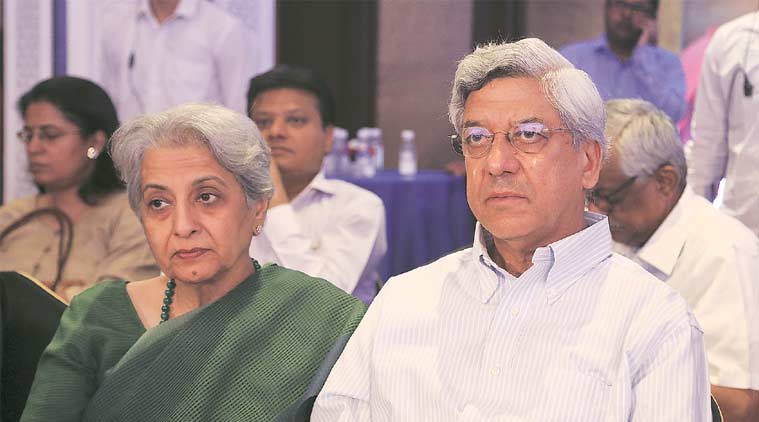 Niraja Gopal Jayal, JNU professor, with husband, business consultant Rakesh Dhar Jayal.
Niraja Gopal Jayal, JNU professor, with husband, business consultant Rakesh Dhar Jayal.
On performative nationalism
I recently released Prof Sugata Bose’s book and a fine debate took place there. I did not participate in it but I listened to it. One point emerged there, that if you try to define Indian nationalism you will have to keep in mind and always reflect on the observations of three great persons—Mahatma Gandhi, Swami Vivekanand and Rabindranath Tagore. By nationalism they meant never indulge in narrow sectarianism. If you indulge in narrow interpretation of it (nationalism), it will lead to sectarianism and the disaster it can bring to humanity can be illustrated by the events of the ’30s and ’40s of the last century. Nationalism based on broad humanism, universalism…should be the essence of Indian civilisation, and that is the core of our values of civilisation and we should respect that.
I have strong faith and believe in the goodness of the Indian masses because I’ve seen how mighty and powerful they can be when they decide, and when they decide, they do not decide in isolation. I will conclude by quoting Tagore — Don’t get scared. The boatman who is at the helm, he will take you to the destination. And our Indian people, they will take us to the destination.
 Former President Pranab Mukherjee with Seema Chishti, Deputy Editor, The Indian Express (left), and Vandita Mishra, National Opinion Editor, The Indian Express, at the Express Adda in Delhi.
Former President Pranab Mukherjee with Seema Chishti, Deputy Editor, The Indian Express (left), and Vandita Mishra, National Opinion Editor, The Indian Express, at the Express Adda in Delhi.
On civil society movements
Alert and vigilance of the people are important. I had the opportunity of dealing with Anna Hazare. Even at that time, while giving an interview to BBC, I told the correspondent that this was another manifestation of the Indian people’s movement. They are not satisfied by simply electing their legislators, sometimes they feel that they may participate in the legislation. The fact remains that the urge of the people, demands of the people were emerging in new directions. This was a sign of awareness of the people’s consciousness, their activism and we should help to recognise and find an appropriate place in our system.


